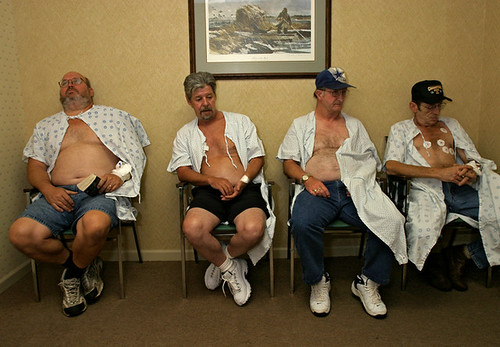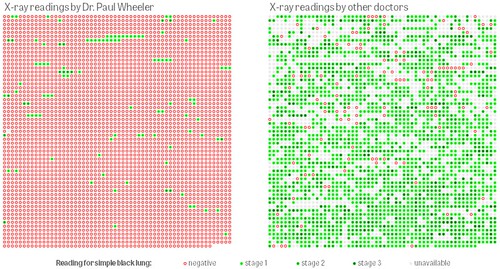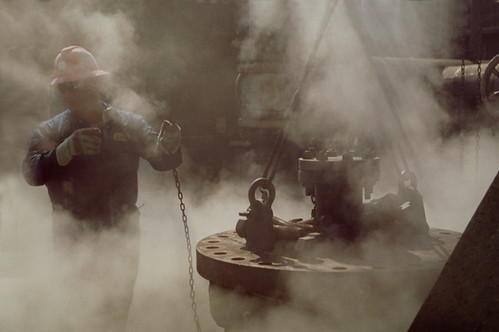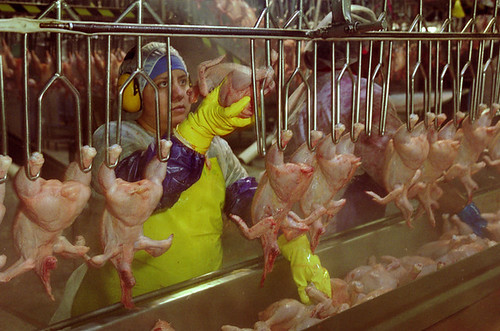|
|
|
|
Introduction
November Newsletter
Edited by Jim Ellenberger
This month we look at three stories highlighting the abject failure of public accountability systems for workers. Systems that are supposed to regulate industries, protect workers from toxic chemicals, and deliver sure and timely workers’ compensation payments have been twisted by private interests to squeeze corporate profits out of workers and their families at any cost. With help from The Johns Hopkins Hospital and high-powered law firms, the coal industry is sickening and killing workers and and then launching secretive medical and legal campaigns to rob miners and their families of millions of dollars in workers’ comp payments.
Meanwhile with even OSHA admitting its own inability to regulate the use of toxic chemicals in fracking and other industries, advocates are calling for states to create transparent, accountable regulatory systems to protect workers and the public. And in Missouri, attacks on the state’s Second Injury Fund remind us how important it is to consider each worker's unique history and circumstances to determine what compensation she needs and how able she is to work.
- Jim Ellenberger
|
|
|
Coal industry pays lawyers, doctors to lie and let workers to die penniless

Photo by Earl Dotter
In a devastating must-read set of reports, the Center for Public Integrity and ABC News
describe how coal companies have fought a cutthroat campaign of secrecy, misinformation, false diagnoses, and defiance of court orders to stop workers from getting workers’ compensation for black lung disease. The coal industry’s tactics mirror those of Big Tobacco, the lead and soda industries, the NFL, and pulp and paper giant Georgia-Pacific,
which is conducting secret research and selectively withholding information to cast doubt on more than 60,000 legal claims filed by construction workers and others who Georgia-Pacific exposed to asbestos in the 1960s and ‘70s and are developing mesothelioma, a cancer nearly always caused by asbestos, today.
Black lung, a disease caused by inhaling coal dust over time, scars and shrinks the lungs and can be highly debilitating and deadly. In its severe form, black lung is supposed to automatically qualify miners for workers’ compensation. Yet in a series of
three in-depth reports, the Center for Public Integrity reveals how the coal industry and its lawyers have fought tooth and nail to hide information on workers’ health from doctors, courts, and patients themselves in order to maintain doubt about people's’ eligibility for compensation.
ABC News interviewed Dr. Paul Wheeler, head of The Johns Hopkins Hospital’s black lung unit, who has reviewed 1,573 miners’ cases for the coal industry. In all those cases he found no instances—not one—of advanced black lung disease, and he told a court that he can’t recall having diagnosed a single case since the 1970s or early ‘80s. Autopsies and biopsies have since proved over 800 cases of black lung (including 160 cases of the advanced form of the disease) in the files Dr. Wheeler reviewed, revealing an extraordinary violation of medical ethics and coal workers' right to compensation for occupational illness:

Graphic by Center for Public Integrity
Following the joint report, Johns Hopkins has suspended its black lung program, Senators Robert Casey and Jay Rockefeller are drafting legislation to reform the Division of Coal Mine Workers’ Compensation at the U.S. Department of Labor, and Congressmen Joe Miller and Joe Courtney have called on the Department’s Inspector General to “investigate publicly
the reported allegations of misconduct by doctors and lawyers working on behalf of the coal industry that has resulted in coal miners being denied health-related benefits and compensation to which they are entitled.”
The financial incentives and the human toll of the coal industry’s campaign are both painfully clear. Mining companies have saved millions of dollars by shifting the costs of black lung disease onto families and society, and for each x-ray Dr. Wheeler reads, Johns Hopkins gets $750, 10 times what a miner’s doctor is paid. The result for miners like Steve Day, who, doctors say, has only a few more months to live, is a protracted battle to get the compensation they and their families are supposed to be guaranteed. For many, proof of black lung comes only on the autopsy table.
This horrific scandal only reaffirms what injured and ill workers and advocates have known for many years: the role of medical professionals as industry henchmen must end.
Visit the Center for Public Integrity for the full articles, photos, interactive features, history, and the feature, “Inside a Coal Company Exam”.
|
|
|
With OSHA unable to protect workers and the public from toxic chemicals, advocates call for transparent, accountable regulation
Last month the West Virginia Supreme Court upheld a decision to deny a worker’s black lung claim not based on his medical condition, but on evidence that his employer was not at fault because it had only exposed workers to what OSHA
considers safe levels of toxicity. Though this decision hinged on a peculiar loophole in West Virginia law, the case points to the broader problem of OSHA’s woefully inadequate permissible exposure limits for toxic substances. The agency has admitted that many of its limits “are outdated and inadequate for ensuring protection of worker health” and is providing stricter exposure limits published by other agencies and nonprofits—plus an online toolkit
of safer chemical substitutes—that better reflect research conducted in the 43 years since the Occupational Safety and Health Act was passed. As the Center for Progressive Reform explains, though, relying on voluntary action by responsible employers is not enough: these resources must be matched with transparent, accountable enforcement mechanisms to protect all workers.

Photo by Earl Dotter
The Center for Effective Government seconds the call for a more accountable regulatory system in a new report recommending state legislation to protect whistleblowers against retaliation for reporting health and safety violations. (Retaliation, as the Wall Street Journal reported
in July, is a major problem for workers reporting injuries or seeking workers’ comp.) Arguing that state campaigns offer more promise than reforms in Washington, the Center advocates for state legislation to give workers more time to file a complaint, speed up investigations of retaliation, authorize agencies to preliminarily reinstate terminated employees, lower the burden of proof, and allow workers to pursue their own cases when OSHA does not.
Environment America reports that fracking for natural gas—a fossil fuel billed as a clean alternative to coal—is exposing workers, the environment, and the public to a dangerous mix of chemicals. This highly controversial method of extracting gas by forcing chemical-laden water into the ground has injected two billion gallons of chemicals into the soil of seventeen states since 2005, produces 450,000 tons of air pollution per year, and exposes some 25,000 workers to dangerous silica dust.
A scorecard report just released by a coalition of environmental health organizations has found a veil of secrecy over fracking firms’ handling of toxic chemicals, water and waste, air emissions; community impacts; and governance. This egregious lack of transparency keeps everyone in the dark about the magnitude of the risks to workers, the public, and our environment. And while OSHA has finally released a long overdue proposed rule to reduce workers' exposure to silica, it is expected to face stiff opposition from industry.
With nearly 100 facilities using large amounts of hazardous chemicals in their state, New Jersey activists are taking up the fight. A coalition of labor, firefighter, and environmental organizations has released a report finding that Gov. Christie’s administration has consistently allowed businesses to sidestep rules requiring safer chemicals and processes. The coalition is working to hold companies and the State accountable.
|
|
|
Controversial reforms threaten Missouri workers with occupational illnesses and secondary injuries
In Missouri, a controversial new law
is being proposed to shore up an insolvent fund for workers and
bring toxic exposure diseases under workers’ compensation. The Second Injury Fund, established to provide additional compensation workers need when a pre-existing injury is exacerbated through work, became insolvent after the legislature capped employers’ payments into the fund, leaving the state unable to pay over $32 million in benefits to 1,380 people. Now legislators are moving to solve the false fiscal crisis they created by cutting hospitality and other workers out of the system, cutting out anyone with less than permanent total disability, temporarily raising employers’ payments, and barring workers who suffer from toxic exposure from suing their employers in court, instead funneling them into a
workers’ compensation system unlikely to meet their needs. Meanwhile in a case decided November 12, the Missouri Supreme Court decided that a worker who is disabled by multiple moderate injuries cannot claim benefits through the Second Injury Fund: the worker must have a second injury that is serious enough on its own to sufficiently impair the worker. The Missouri AFL-CIO and allies argue that all of these measures will block Missouri workers from getting the compensation they need.
|
|
|
NEWS ROUNDUP
NY Workers' Comp Board restructuring moves forward with little concern for worker input
The New York State Workers’ Compensation Board
has hired private consulting giant Deloitte to conduct what it calls “a sweeping effort to examine the workers' compensation system … and re-create a system that effectively serves the needs of injured workers and employers.” In practice, the Board has held dozens of meetings to solicit input from employers, insurers, attorneys, and medical providers, but appears to be consulting workers only as an afterthought. While they are already drawing conclusions based on the earlier round of meetings, Deloitte and the Board are only now soliciting input from injured workers, unions, and other workers’ organizations through a
narrowly constructed survey and three drop-in days
at Board offices, where workers are told to fill out the survey but have no meaningful participation in a system supposedly designed for them. Injured workers, workers’ centers, the New York State AFL-CIO, immigrant groups, occupational health clinics and others are crying foul and demanding transparency and accountability. Listen to a public radio report
featuring a stone cutter and an organizer with the Workers' Center of Central New York, and read more from Occupational Health Clinic Centers and NYCOSH.
OSHA promotes research transparency and better tracking
OSHA has asked for the first time that published studies disclose their funding source and sponsoring organization, as well as the extent to which an affected party reviewed the research results before publication. It has also proposed a new rule to improve tracking of occupational injuries and illnesses by requiring large employers to electronically submit data more frequently.
Payroll fraud rampant in TX construction industry
In Texas, a local electrical workers’ union sent members undercover to investigate payroll fraud in the construction industry. They found that more than 40% of construction workers are misclassified as independent contractors by their employers and have therefore been exempted from labor protections and robbed of millions of dollars in pay and benefits.
Massachusetts families push for sufficient death benefits
The families of Massachusetts workers who have died on the job are pushing a bill to raise the inhumanely low death benefits provided under workers’ compensation for the families of deceased workers. According to MassCOSH, death benefits have remained unchanged for decades and don’t come close to covering the cost of a funeral.
OK Supreme Court reviews challenge to workers comp overhaul
While the Oklahoma Supreme Court has decided to consider the challenge to SB 1062, the state’s recent anti-worker workers’ comp overhaul, Gov. Mary Fallin has appointed the final two members of the workers’ comp administrative board created by the new law. As expected, these political appointees have pro-business backgrounds.
USDA looks to speed up poultry line, advocates cry foul
Despite “loud and clear opposition from civil rights, food safety, public health and the workers’ safety communities,” the USDA continues to move forward with plans to speed up poultry plant lines, a move that would have dire health consequences for poultry workers already at high risk for accidents and chronic injuries.

Picture by Earl Dotter
Employer let off the hook in NJ worker fatality case
A New Jersey court has rejected a case charging a waste disposal company with the death of a worker for disabling a key safety feature on a truck. The case highlights the extremely high burden proof that workers must meet in many states to take their case outside of the workers’ comp system when the system fails them.
Mexican factory explosion draws little US media attention
In Mexico, an industrial explosion killed four workers in a plant that manufactures American Halloween candy. In the wake of the disaster, Garrett Brown, coordinator of the California-based Maquiladora Health & Safety Support Network, pointed to a global economic system that creates incentives for U.S. employers and U.S.-based transnationals to avoid investing in health and safety programs “despite every study” demonstrating the economic benefits of workplace safety.
Visit us at www.workerscomphub.org! We invite you to suggest events and actions for inclusion on the website or share resources and tools. If you have a perspective or story that you would like to share, please contact Ben Palmquist about writing a guest blog for the site.
|
|
|
|
|
|




